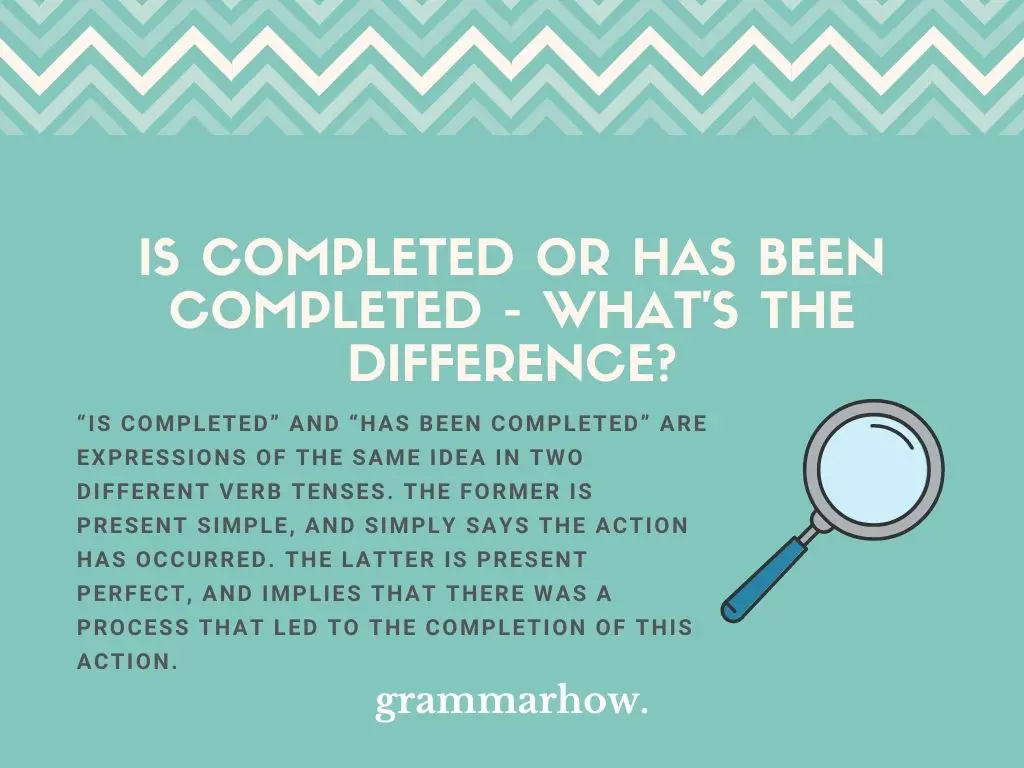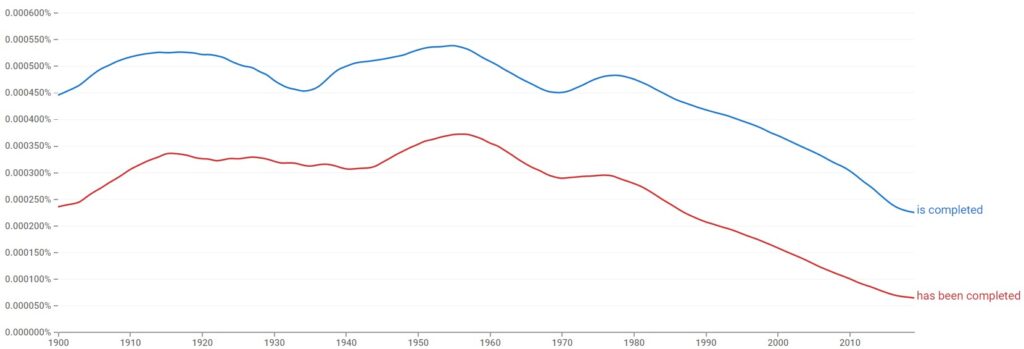Many phrases in the English language are deceptively simple, but actually might have some nuance that distinguishes them. What’s the difference between “is completed” and “has been completed”? Do they express the same thing? Or are they different concepts somehow? This article will answer all of these questions.
Is Completed or Has Been Completed – What’s the Difference?
“Is completed” and “has been completed” are expressions of the same idea in two different verb tenses. The former is present simple, and simply says the action has occurred. The latter is present perfect, and implies that there was a process that led to the completion of this action.

Both of these phrases are extremely similar, and can in fact be used interchangeably in many contexts. However, they won’t always be equivalent, so you should know the difference between them.
“Has been completed” can be used to emphasize certain aspects of the process that led to this completion that “is completed” doesn’t necessarily emphasize to the same degree.
Is Completed
“Is completed” is the present simple expression of the completion of something. It’s a remarkably simple and straightforward expression, without many complications or layers of implications. You can always use this expression to talk about the end of a process.
“Is completed” is a good expression to use that has no baggage or complex phrasings attached to it. When you use it, you simply are saying that something is now complete.
Here are some example sentences that include “is completed” in them:
- I believe that the movie is completed now, so we just have to wait.
- The new game is completed, so they will be releasing it soon, I’m sure.
- The new issue is completed, I will publish it as soon as I can.
- My exam is completed, so I will turn it in and then go to the cafeteria.
- My major is completed, I don’t have to take any more classes, which is very exciting.
Has Been Completed
“Has been completed” is the present perfect way to express the completion of something. You use it when you really want to emphasize the process behind the completion of something, when you want to highlight the fact that this occurred through an extensive process.
Using “is completed” can give off the impression that the completion in question was binary, meaning that it went from uncompleted to completed in a second.
By using “has been completed” you remove this impression, and give weight to the idea of the process through which the completion occurred.
Here are some examples that showcase the use of “has been completed” in several sentences:
- My thesis has been completed, and it was such an arduous process that I’m now super glad.
- Preproduction work has been completed on the film, so production starts soon.
- Her class has been completed, and now she just has to grade the final essays.
- His project has been completed successfully, and the company has greatly benefited from it.
- My life’s work has been completed, and I couldn’t be happier about it.
Which Is Used the Most?
According to information gathered by the Google Ngram Viewer, “is completed” is significantly more common in use than “has been completed”. This makes sense, as “has been completed” is a more complex verb tense, and will therefore see less use.

The data the graph has gathered starts at the year 1900 and ends in the year 2019, and in all these years “is completed” has consistently been more popular than “has been completed”.
However, although “has been completed” has never even come close to surpassing “is completed” in popularity, there is a trend worth drawing attention to.
The peaks and valleys in the popularity of both phrases matches, when the first phrase became popular, so did the second one, when the second one lowered its popularity, so did the first one.
Final Thoughts
“Is completed” and “has been completed” both express the same thing: the completion of something. The former is simple present, and carries no hidden implication. The latter is present perfect, and emphasizes the process that led to its completion. They can be interchangeable, but this isn’t always the case.

Martin holds a Master’s degree in Finance and International Business. He has six years of experience in professional communication with clients, executives, and colleagues. Furthermore, he has teaching experience from Aarhus University. Martin has been featured as an expert in communication and teaching on Forbes and Shopify. Read more about Martin here.
